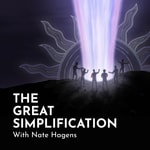Ex nihilo - Podcast English – Details, episodes & analysis
Podcast details
Technical and general information from the podcast's RSS feed.

Ex nihilo - Podcast English
Martin Burckhardt
Frequency: 1 episode/25d. Total Eps: 27

Recent rankings
Latest chart positions across Apple Podcasts and Spotify rankings.
Apple Podcasts
🇩🇪 Germany - books
15/09/2024#73🇩🇪 Germany - books
05/09/2024#82🇩🇪 Germany - books
02/09/2024#86
Spotify
No recent rankings available
Shared links between episodes and podcasts
Links found in episode descriptions and other podcasts that share them.
See all- https://www.theguardian.com/us
21 shares
RSS feed quality and score
Technical evaluation of the podcast's RSS feed quality and structure.
See allScore global : 48%
Publication history
Monthly episode publishing history over the past years.
Im Gespräch mit ... Elena Esposito
lundi 26 août 2024 • Duration 53:15
Das stärkste Antidot, das den Einzelnen davor bewahrt, sich einem Phantasma anheimzugeben, ist zweifellos, dass man das, worüber man theoretisierend nachzudenken sich anschickt, in der Praxis kennengelernt hat. Und was die junge Soziologin Elena Esposito, die zunächst bei Umberto Eco Soziologie studierte, später bei Niklas Luhmann in Bielefeld habilitierte, davor bewahrte, eine Künstliche Intelligenz herbeizubeschwören, wo doch lediglich die Gesetze der Wahrscheinlichkeit walten, war, dass sie, um Geld zu verdienen, eine Zeitlang als Consultant für eine große Computerfirma tätig war, welche die aufblühende Games-Industrie mit neuen Werkzeugen versorgte. Diese Vertrautheit mit Programmierern, ihren Denkgewohnheiten und den Phantasien, die sich im Game-Development herausgebildet haben, hat den Blick der Soziologin herausgefordert: jene Veränderungen in den Blick zu nehmen, welche der alltägliche Umgang mit Computern für unsere Kommunikation mit sich bringt. Und genau dies war es, was das Gespräch mit Elena Esposito zu einem regelrechten Vergnügen gemacht hat: dass man sich nicht über irgendwelche Phantasmen austauscht (»Wird der Computer den Menschen ersetzen?«), sondern über das, was Sache ist. Was den coolen Blick der Soziologin zur Geltung bringt, die mit großer Sorgfalt seziert, was es für eine Gesellschaft bedeutet, mit unverständlichen Maschinen in die Kommunikation einzutreten.
Elena Esposito lehrt Soziologie an der Universität Bielefeld und an der Universität Bologna.
Von Elena Esposito sind erschienen:
Thanks for reading Ex nihilo - Martin Burckhardt! Subscribe for free to receive new posts and support my work.
Themenverwandt
This is a public episode. If you would like to discuss this with other subscribers or get access to bonus episodes, visit martinburckhardt.substack.com
Talking to ... Sergei Medvedev
samedi 20 juillet 2024 • Duration 01:04:16
While the harbingers were already visible long before, the Russian invasion of Ukraine has made it clear that the days of the comparatively peaceful post-war order are numbered. Nevertheless, the calculations leading to all of this remain largely mysterious. How could a society such as the Russian one embark on such an adventure in which it reveals itself to the world as a terrorist state? The historian Sergei Medvedev, who saw the approaching catastrophe coming with his The Return of the Russian Leviathan, goes back deep into Russia's history to explain Putin's motivation - to figures such as Ivan the Terrible, the Golden Horde and the Chekists, who personify the legal State of Emergency. Medvedev's diagnosis, which sees Russia as the unconscious of a spiritually eroding postmodern age, is extremely dark. According to him, the invasion of Ukraine marked the beginning of World War III, which began with the invasion of Ukraine.
Sergei Medvedev is an Affiliate Professor at Charles University in Prague. Born in Moscow, he studied at Moscow University and Columbia University in New York City. He specializes in political history, international affairs, and Russian studies. After over 15 years as a Professor and Associate Dean at the Higher School of Economics in Moscow, he left Russia in March 2022. For many years, Sergei Medvedev was a contributing columnist to Russian Forbes, Vedomosti, and The Republic and filmed programs on history and culture for the Russian Kultura TV and TV Rain. Since 2015, he has been working for Radio Free Europe/Radio Liberty, where he hosts the intellectual talk show Arkheologiya.
Recent Books
Related Content
This is a public episode. If you would like to discuss this with other subscribers or get access to bonus episodes, visit martinburckhardt.substack.com
Talking to ... Jeff Sutherland (Audio)
samedi 20 janvier 2024 • Duration 01:10:58
Looking at many contemporary institutions, we can't help thinking Modernity's secret goal lies in its organizational irresponsibility. In the shadows, however, a revolution has occurred where the individual doesn’t have to function as a cog in the Wheelwork of a Machine. Instead, they’re given the freedom to work in small, highly agile groups responsible for the efficiency and quality of their product. Inspired by the novel Toyota Production System of Teamwork (TPS) that Japanese engineer Taiichi Ohno developed on the car manufacturer's factory floors, this movement found its spirtitus rector in Jeff Sutherland - a thinker whose Agile Manifesto (co-authored with Ken Schwaber in 2001) has promulgated this project management’s style in all areas of life. And if you consider Sutherland is advocating a method without methodology that’s essentially a staged form of chaos, you immediately sense a highly unconventional spirit at work here.
As a West Point graduate, Jeff Sutherland was deployed flying reconnaissance over enemy territory in the Vietnam War – missions that often cost his fellow pilots their lives. Then, as a young statistician in Radiology, he was asked to apply his knowledge in cancer cell research, where his expertise unexpectedly catapulted the Stanford assistant professor into the financial industry. Here he experienced the problems of a strictly top-down, hierarchical management style and developed his idea of Scrum. That is small groups of people who, like a deeply attuned Rugby team, work out their interactions with each another - and in the form of blind agreement – develop a step-by-step efficiency that puts to shame everything designed to date. In this respect, it’s no coincidence this idea has found its way into the modern working world after becoming the startup world's undisputed paradigm. And that’s precisely what an energetic 82-year-old Jeff Sutherland tells us in his interview with Ex nihilo - the story of a revolution set on a permanent course.
Life is What Happens To You While You’re Busy Making Other Plans (John Lennon)
In German:
Related Content
This is a public episode. If you would like to discuss this with other subscribers or get access to bonus episodes, visit martinburckhardt.substack.com
Philosophy of the Machine 11
samedi 23 décembre 2023 • Duration 33:02
If we remember that the machina mundi, like the Deus ex Machina, flies in from above, it's unsurprising that the scene of the Machine Discourse shifts to where the Politics of Heaven are fought over. It's the emerging Christianity that takes up the Machine question - albeit in a way that seems like a palimpsest, a parchment that has been scraped over and over again: constantly rewritten.
This chapter deals with the paradox of the Christian world (which is trying to free itself from ancient materialism) becoming the catalyst of the Machine World - through the detour of Universal Scriptural Writing and the Assumption of the Immaculate Conception. It's a movement that inevitably led to the building of Cathedrals, the founding of Universities, and the book society of the Renaissance.
Speaker: Hopkins Stanley
Sound-Design: Martin Burckhardt
Music: Hopkins Stanley & Martin Burckhardt
From: The Philosophy of the Machine, translated by Hopkins Stanley and Martin Burckhardt. (to be published)
To listen to previous chapters:
Here is the Link for the German Publication at Matthes & Seitz
This is a public episode. If you would like to discuss this with other subscribers or get access to bonus episodes, visit martinburckhardt.substack.com
Talking to Roger Pielke jr. (Audio)
dimanche 13 août 2023 • Duration 50:53
You might call Roger Pielke Jr., the son of the highly respected Climatologist Roger Pielke Sr., an Environmental Political scientist who analyzes the atmospheric disruptions between Science and Politics. And because, with the looming apocalypse, this represents mined terrain, Dr. Pielke, who's been awarded international prizes and honorary doctorates for his work and served as director of the Center for Science and Technology Policy Research at the University of Colorado, Boulder, has found himself at the center of a campaign that made him, as he puts it, the Voldemort of climate science. Paradoxically, this label has nothing to do with Pielke's measured observations, delivered with the beautiful clarity of a true scientist, but solely with the veritable religious furor that activists and world-savers have brought to the debate. This position of Pielke's is based on a timeless scientific ethos, which never allows itself to become aligned with any cause - knowing that the cost of such activism is sacrificing science's integrity. On the other hand, the liminal position between Science and Politics has made him highly sensitive - so when Mary Douglas' name comes up in the conversation, he's immediately familiar with her institutional theory and mentions Steve Rayner's work, appropriately titled The Social Construction of Ignorance, explaining that institutions are not necessarily formed to produce new knowledge, but often to keep uncomfortable or inconvenient learning out of sight. But because Pielke is stubborn enough to endure even the disruptive and inappropriate, he doesn't shy away from the adversity - he only points out at the end of the conversation; however, that contradiction is more manageable at an advanced age and that Academia might not be the ideal place for an up-and-coming Roger Pielke III’s career choices.
Roger Pielke has published.
Related Topics
This is a public episode. If you would like to discuss this with other subscribers or get access to bonus episodes, visit martinburckhardt.substack.com
Philosophy of the Machine 10
mardi 8 août 2023 • Duration 39:31
The chapter deals with the birth of metaphysics and eternal damnation, the emergence of that peculiar attitude of mind called Gnosis in the science of religion. That the Earth becomes transformed into a vale of tears is, in this sense, a dialectical necessity. That culture becomes the angel maker.
If the pure sign represents the appearance of eternity, the question arises why we still concern ourselves with the decrepitude of the earthly. Why not live eternally right away?
Speaker: Hopkins Stanley
Sound-Design: Martin Burckhardt
Music: Hopkins Stanley & Martin Burckhardt
From: The Philosophy of the Machine, translated by Hopkins Stanley and Martin Burckhardt. (to be published)
To listen to previous chapters:
hier der Link zur Publikation bei Matthes & Seitz
This is a public episode. If you would like to discuss this with other subscribers or get access to bonus episodes, visit martinburckhardt.substack.com
Philosophy of the Machine 9
mardi 4 juillet 2023 • Duration 52:29
The idea of another world arises with the pure, animate signs: Pure spirit, eternity, Platonic bodies. In contrast, the real world is a cave, an underworld realm of shadows, in which illusory existences see only reflections of their destiny: the reflection of the true, the good, and the beautiful.
The chapter tells of philosophy's birth - and of how thinking thus begins to run in circles:
That which philosophy considers as being or essence is the art of running in the circle of the universal machine. En kyklos paidein. But as we know, still every encyclopedia is alphabetical.
Speaker: Hopkins Stanley
Sound-Design: Martin Burckhardt
Music: Hopkins Stanley & Martin Burckhardt
From: The Philosophy of the Machine, translated by Hopkins Stanley and Martin Burckhardt. (to be published)
To listen to previous chapters:
hier der Link zur Publikation bei Matthes & Seitz
This is a public episode. If you would like to discuss this with other subscribers or get access to bonus episodes, visit martinburckhardt.substack.com
Talking to ... Malcom Kyeyune
samedi 24 juin 2023 • Duration 01:13:38
Occasionally, we must admit we belong to an older generation with worldviews shaped by our specific generational experiences. This, at least, was what crossed my mind while reading the text of a young Swedish writer considering the question of whether our present-day culture wars could be the result of an elite overproduction in the form of an educational glut from a flawed educational system; often leading its actors into the fiercest battles, not infrequently unfairly waged, for the remaining high-status jobs. The most interesting thing about this reflection is its tribute to the forgotten American political scientist James Burnham, who’d analyzed an emerging new ruling class in the forties with the publication of his Managerial Revolution – incidentally, which significantly influenced George Orwell’s writing of 1984. In his referencing of this thinker, who was a Trotskyist that metamorphosed into a staunch conservative, Malcom Kyeyune finds a diagnosis for the present as something quite comparable: an emerging new Woke elite class that distinguishes themselves morally rather than economically while teaching the world of its possibility. He notices that they are engaging in a moral economy that can be used for career advancement, social status, and economic advantage, often at the economic and career expense of the disadvantage they supposedly represent. And because Malcolm still considers himself a Marxist, our conversation (even if it lightly crosses different eras, cultures, and continents) revolves around questioning what drives this strange moral economy.
Malcolm Kyeyune is a fearlessly provocative blogger and writer living in Uppsala, Sweden. He shouts for Aftonbladet but primarily for English-language venues like UnHerd, American Affair, and Compact Magazine.
Correspondigs topics
This is a public episode. If you would like to discuss this with other subscribers or get access to bonus episodes, visit martinburckhardt.substack.com
Philosophy of the Machine 8
mardi 16 mai 2023 • Duration 31:10
The chapter deals with the birth of Pythagorean mathematics - or, more precisely, the way with which mathematicians fall into the delirium of Infinity.
Carnival. In that old-fashioned sense, every mathematical calculus has a strange carnivalesque side because you extract the flesh from life. Just as the tones of the music are abstracted from the body of sound, the formula dissolves an experience from reality, imposing on it a system of rules in which the highest is at the bottom, the lowest is at the top.
Speaker: Hopkins Stanley
Sound-Design: Martin Burckhardt
Music: Hopkins Stanley & Martin Burckhardt
From: The Philosophy of the Machine, translated by Hopkins Stanley and Martin Burckhardt. (to be published)
To listen to previous chapters:
Here’s the link to the original German edition.
This is a public episode. If you would like to discuss this with other subscribers or get access to bonus episodes, visit martinburckhardt.substack.com
Philosophy of the Machine 7
mercredi 5 avril 2023 • Duration 43:11
The chapter tells of how the Machine, as socioplasty, inscribes itself on antiquity - how it becomes an ideal of personality and, as imprinted freedom, ultimately determines social relations.
From then on, sacrifices were no longer made to the gods but to the Polis. It is no coincidence that taxation is the only area in which we still talk about having to make sacrifices today.
Speaker: Hopkins Stanley
Sound-Design: Martin Burckhardt
Music: Hopkins Stanley & Martin Burckhardt
From: The Philosophy of the Machine, translated by Hopkins Stanley and Martin Burckhardt. (to be published)
To listen to previous chapters:
This is a public episode. If you would like to discuss this with other subscribers or get access to bonus episodes, visit martinburckhardt.substack.com









